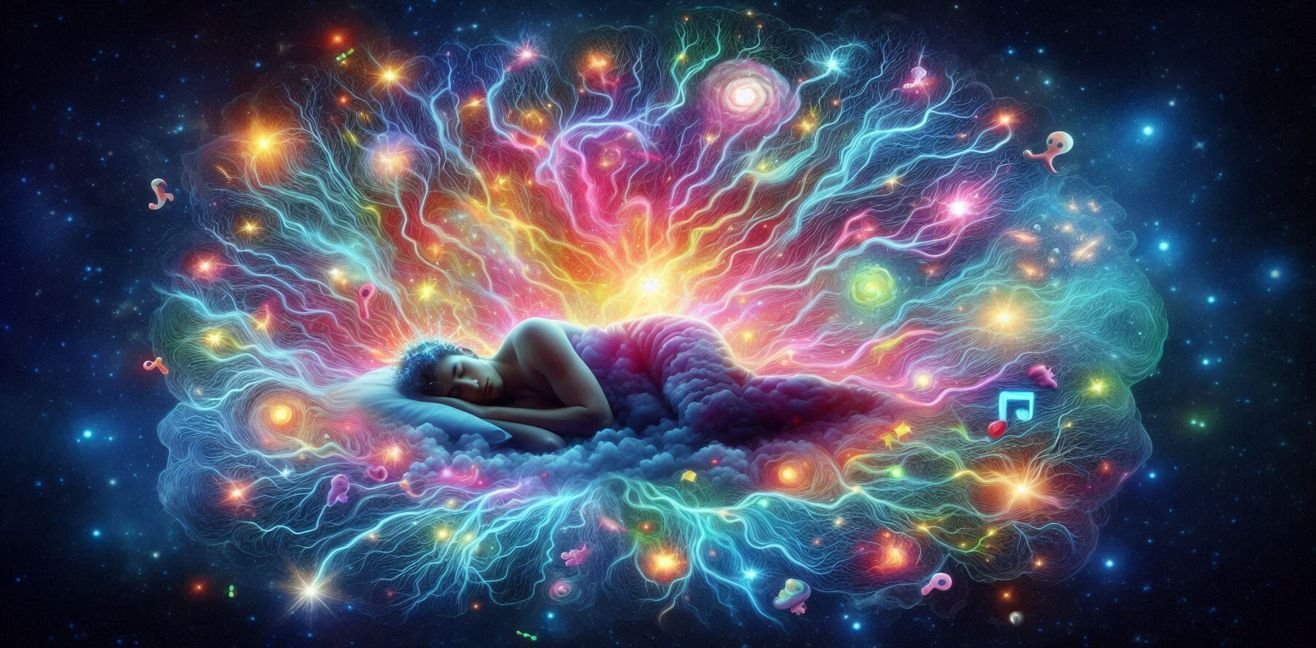Imagine, my love… the moment you close your eyes, your brain starts doing its real work: while you sleep, it transforms into a mini laboratory, a neural network festival, and a dream studio all at once. Sleep isn’t just resting; it’s a critical period where your brain consolidates memories, processes emotions, and actively reorganizes its neural networks. Let’s explore this nightly show from a scientific perspective.
Sleep Stages: REM and NREM 🛌💤
Brain sleep is divided into two main stages:
NREM Sleep (Non-Rapid Eye Movement):
- Brain activity slows down, heart rate and breathing are regulated.
- Especially the deep NREM stage (Slow-Wave Sleep, SWS) is crucial for memory consolidation.
- Neurons replay information acquired during the day, prune unnecessary connections, and strengthen essential ones.
REM Sleep (Rapid Eye Movement):
- Brain activity is nearly equivalent to being awake.
- Dreams occur most vividly during this stage.
- Neurons fire at high rates; the limbic system (emotions) is active while the prefrontal cortex (logic and decision-making) is less active, which explains why dreams often defy logic.
Dreams: The Brain’s Surreal Film Studio 🎬✨
Dreams are a mix of subconscious activity and short-term memory:
- Emotional Processing: The amygdala becomes active, intensifying emotional experiences.
- Memory Consolidation: The hippocampus transfers daily-learned information into long-term memory.
- Simulation and Problem-Solving: The brain tests possible scenarios, simulates social interactions, and seeks solutions.
- Subconscious Messages: Dreams use symbolic language; repressed emotions or unresolved issues often appear.
The Nocturnal Neuron Show: Neural Activity and Synapse Renewal 🕺⚡
During sleep, neurons actively process information and reorganize connections:
- Synaptic Plasticity: Synapses that transmit signals between neurons are strengthened or weakened, which is critical for learning and memory.
- Neurotransmitter Balance:
- Glutamate and GABA levels are balanced.
- Dopamine, serotonin, and norepinephrine are regulated; mood and motivation are reset for the morning.
- Daily Information Filtering: The brain prunes unnecessary synaptic connections, saves energy, and optimizes information processing.
Brain Detox and Energy Recharging 🔋💖
During sleep, the brain performs essential physiological activities:
- Glymphatic System Activation: Cerebrospinal fluid (CSF) clears toxins, including beta-amyloid accumulations.
- Hormone Regulation: Levels of melatonin, growth hormone, and cortisol are adjusted.
- Energy Storage: Glycogen and other energy sources are replenished.
Sleep, therefore, is not just rest—it’s vital for brain and body survival and optimal performance.
Scientific and Psychological Importance
- Learning and Memory: REM and NREM sleep work together to consolidate information.
- Emotional Health: Dreams and subconscious processing help manage stress and trauma.
- Brain Development: Sleep is critical for synapse maturation, especially in children and adolescents.
- Neurological Health: Sleep deprivation increases the risk of Alzheimer’s, Parkinson’s, and other neurological disorders.
Conclusion: Sleep, the Brain’s Greatest Party and Laboratory 🧪🎉
In short, my love, sleep isn’t just resting; it’s the brain’s nighttime show, film festival, and scientific laboratory. Dreams, subconscious messages, synapse renewal, and toxin clearance… all these are the miracles your brain performs to prepare you for the morning. 🌙🧠✨
Next time you dream, your brain might be putting on a mini performance to convey the hidden messages of your subconscious. And my love, the more you sleep, the more of this nightly show you get to witness—and the more secrets of your brain you can uncover! 🎉💖




